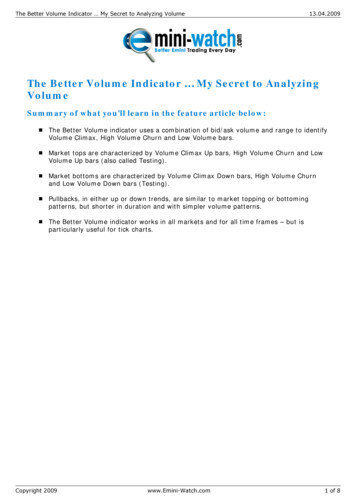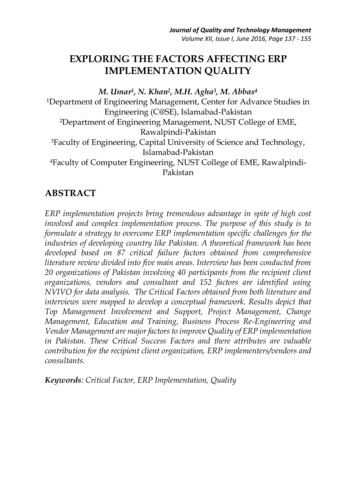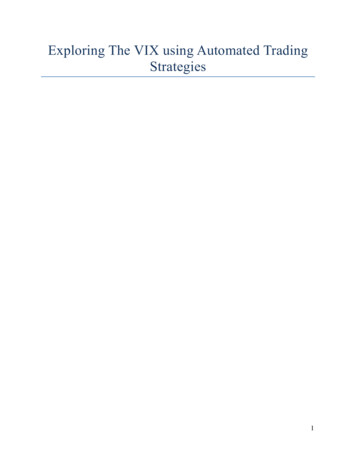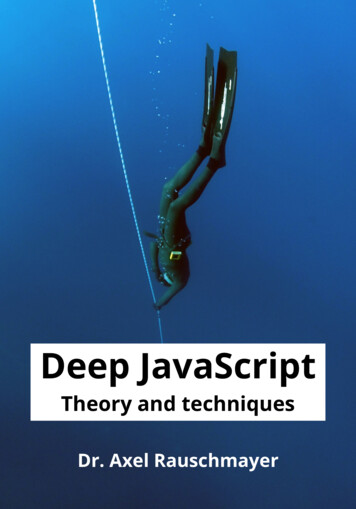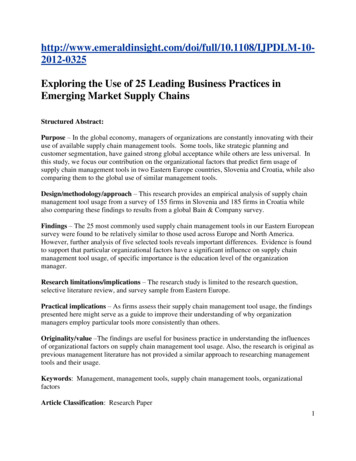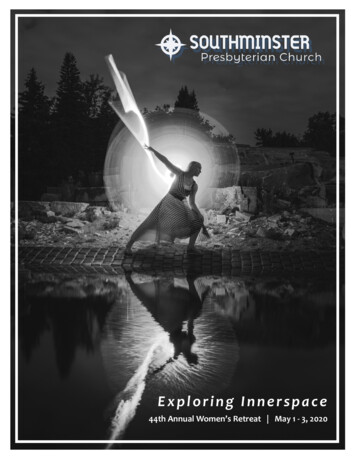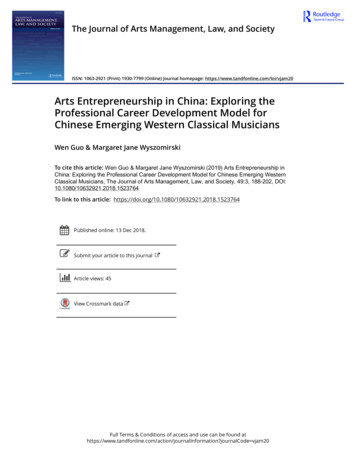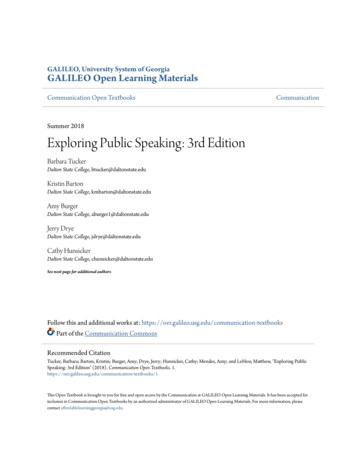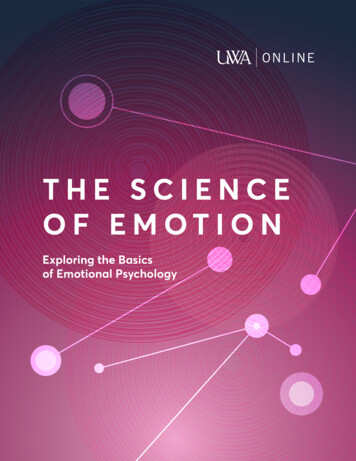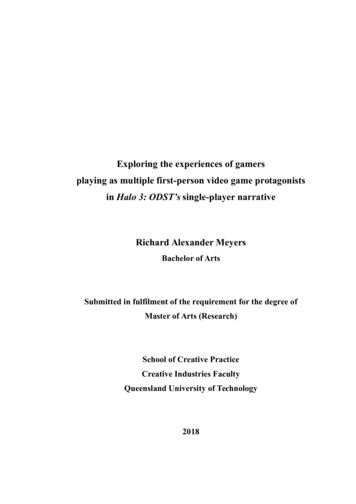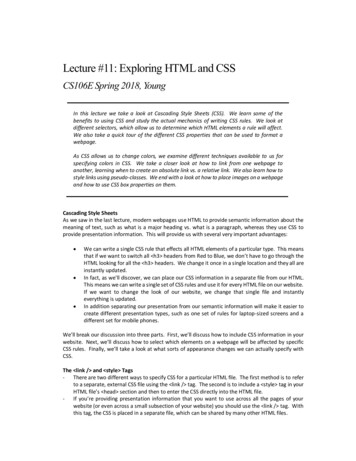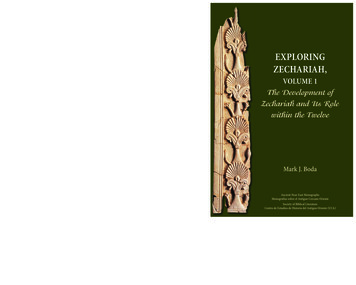
Transcription
MARK J. BODA is Professor of Old Testament at McMaster DivinityCollege. He is the author of ten books, including The Book of Zechariah(Eerdmans) and Haggai and Zechariah Research: A Bibliographic Survey(Deo), and editor of seventeen volumes.EXPLORING ZECHARIAH, VOLUME 1This first volume of Mark J. Boda’s two-volume set on Zechariah showcasesa series of studies on the development of Zechariah as a book and itsrole within the development and rhetoric of the Book of the Twelve. Itfocuses on the composition of Zechariah; the relationships between Zech1–8 and Zech 9–14 and among Zechariah, Haggai, and Malachi; and theplacement of Zechariah within the Book of the Twelve. The collection ofthese slightly revised previously published essays leads readers along theargument that Boda has been developing over the past decade.EXPLORINGZECHARIAH,VOLUME 1The Development ofZechariah and Its Rolewithin the TwelveAncient Near East MonographsMonografías sobre el Antiguo Cercano OrienteElectronic open access edition (ISBN 978-0-88414-198-3) available athttp://www.sbl-site.org/publications/Books ANEmonographs.aspxCover photo: Zev Radovan/BibleLandPictures.comBodaSociety of Biblical LiteratureCentro de Estudios de Historia del Antiguo Oriente (UCA)Mark J. BodaAncient Near East MonographsMonografías sobre el Antiguo Cercano OrienteSociety of Biblical LiteratureCentro de Estudios de Historia del Antiguo Oriente (UCA)
EXPLORING ZECHARIAH,VOLUME 1
ANCIENT NEAR EAST MONOGRAPHSEditorsAlan LenziJuan Manuel TebesEditorial BoardReinhard AchenbachC. L. CrouchEsther J. HamoriChistopher B. HaysRené KrügerGraciela Gestoso SingerBruce WellsNumber 16
EXPLORING ZECHARIAH,VOLUME 1The Development of Zechariah and Its Rolewithin the TwelvebyMark J. Boda
AtlantaCopyright 2017 by SBL PressAll rights reserved. No part of this work may be reproduced or transmitted in any formor by any means, electronic or mechanical, including photocopying and recording, or bymeans of any information storage or retrieval system, except as may be expressly permitted by the 1976 Copyright Act or in writing from the publisher. Requests for permissionshould be addressed in writing to the Rights and Permissions Office, SBL Press, 825 Houston Mill Road, Atlanta, GA 30329 USA.Library of Congress Cataloging in Publication Control Number: 2016961865Printed on acid-free paper.
Ad majorem Dei gloriamFor Paul Redditt
ContentsPrefaceixAbbreviations1.xiiiFrom Zechariah to the Twelve:The Compositional History of the Book of Zechariah12.From Fasts to Feasts: The Literary Function of Zechariah 7–8313.Echoes of Salvation: Zechariah 8:1–13 as the Capstone of theHaggai–Zechariah 1–8 Corpus514.Figuring the Future: Haggai–Malachi and the Messiah595.Messengers of Hope in Haggai–Malachi896.Perspectives on Priests in Haggai–Malachi1077.Priestly Expansions within Haggai–Malachi1278.Babylon in the Book of the Twelve1379.Penitential Innovations within the Twelve16110. Penitential Priests in the Twelve17911. A Deafening Call to Silence: The Rhetorical “End” of HumanAddress to the Deity in the Book of the Twelve19312. Afterword219Bibliography221Ancient Sources Index249Modern Authors Index269- vii -
PrefaceDuring the past three decades the book of Zechariah has received increasing attention within the Hebrew Bible guild. This was due no doubt to the appearanceof the influential commentaries of Eric and Carol Meyers as well as David Petersen beginning in the 1980s, but also to the increasing focus on the Persian period in historical and biblical scholarship. Research during this period has beendiverse, focusing on the composition, the structure, and the reception of this ancient text and all points in between. The guild has been witness to a shift fromdominantly diachronic methodologies to a diversity of diachronic, synchronic anda-chronic approaches, reflecting a (con)fusion of modern, postmodern and evenpremodern sensibilities.It was the book of Zechariah that provided me a fresh direction for researchafter spending my doctoral years focusing nearly all my attention on Ezra–Nehemiah. My dissertation on Neh 9 ended by giving attention to connections betweenthat penitential prayer and Zech 7–8. Little did I realize that this conclusion wasmy invitation to two decades of focused attention on this “post-exilic” prophet.Shifting to Zechariah provided me a new challenge to engage deeply with a different genre and tradition (prophetic), but also the opportunity to build on mynewfound knowledge of the Persian period. It was a perfect time to enter into thestudy of Zechariah since there was a growing community of scholars with whomI could converse, dialogue, and debate.During these two decades of work I have written two commentaries and inthe process have sought to test my ideas in the Hebrew Bible scholarly guild. AsI look back I can discern two major streams in my research. On the one hand, Ihave pursued the question of the composition of the book of Zechariah and thelimits of the literary activity related to this prophet and his tradition. On the otherhand, I have continued the line of research that I began in my doctoral work, investigating the presence of inner biblical allusions within Zechariah and the impact of these allusions on the reading of the prophetic book. In the present twovolumes I have brought together several articles that have been published in various literary contexts (journals, collected volumes) or presented at scholarly conferences in which I tested my ideas among learned colleagues. Drawing them together into one collection hopefully will help scholars identify the basis, trace thetrajectory, and engage the conclusions to which I have arrived after two decadesof working with the text of Zechariah.- ix -
xThe Development of Zechariah and Its Role within the TwelveThis first volume focuses on the composition of Zechariah.1 When I beganstudying Zechariah the compositional focus was largely focused on the development of the book of Zechariah on its own and in relationship to the book of Haggai. The reigning consensus was that Zech 1–8 was distinct from Zech 9–14 andthat Haggai was probably related either in tradition or redaction to Zech 1–8. Butsoon there was great attention given to the relationship between Zech 1–8 andZech 9–14, between Zechariah and Haggai and Malachi, and to the placement ofZechariah within the Book of the Twelve. These shifts can be observed in my ownbody of work over these decades, and this volume provides me an opportunity toretrace some of my arguments and present them in a logical though not alwayshistorical order. At times I lay a foundation in one chapter and then take it furtherin the next, providing more evidence and teasing out the implications in greaterways. There will be some repetition, but in general each piece is distinct. I havealso slightly revised the articles to fit into their new literary context and wherenecessary to align them with the later development in my thought, but most of thematerial is drawn verbatim from my earlier works cited at the outset of each chapter.2My personal agenda for gathering scholars together for the sessions and eventually the edited book Bringing Out the Treasure was related to having arrived atZech 9 in researching and writing a commentary and having no idea what to dowith this material. Michael Floyd was gracious enough to join me on this ventureas we drew together key scholars in Europe and North America who had workedor were presently working on Zech 9–14. This reveals how important the academic guild has been to me throughout my career to this point. I have foundamong other scholars a place to test my ideas, but more importantly to learn andbe stretched and to remain accountable for my continued progress. Within thefootnotes of Exploring Zechariah you will find many names of those who haveimpacted my scholarship, whether I agree with their conclusions or not. Thesepeople include both the great cloud of witnesses who have researched and writtenin decades past, but also those who are presently engaged in research. What aprivilege we have to enjoy relationships while pursuing the academic love of ourlives. I want to single out one particular individual within the guild who has beena faithful colleague along the way, not only through his superb work in editing a1 For a similar preface but providing an overview of the second volume, see the preface toExploring Zechariah: Volume 2—The Development and Role of Biblical Traditions inZechariah.2 When a chapter appeared in an earlier Festschrift I have removed specific reference to thehonoree in the body of the text (though noted in the first footnote) so as not to distract fromthe argument. Of course, I mean no disrespect by this and still do fully honor and appreciatethe colleague to which it was dedicated.
Prefacexivolume on Ezra–Nehemiah with me, but also through his insightful academicwork which provided a basis for my own and motivated me to pursue key questions on the book of Zechariah. I dedicate this first volume of Exploring Zechariahto Paul Redditt for his faithful and humble service to the guild and in particularhis insights into the editorial process underlying the book of Zechariah.I want to express my thanks to the Society of Biblical Literature ANEM editorial board for accepting these two volumes into their innovative and importantseries. I have appreciated Alan Lenzi for his guidance through the publicationprocess and Nicole Tilford for help with copyediting and layout. Thanks especially goes to Alexander C. Stewart, my graduate assistant, who spent considerable time in the initial and final stages adapting these disparate essays into a usableform for publication. Much of the research for the articles within this volume wassupported by a generous grant from the Canadian Government’s Social Sciencesand Humanities Research Council. This grant allowed me to test my ideas at various guild events and support research assistance for these articles, and for thissupport I am deeply thankful. Also I want to express my thanks to the Senate andBoard of McMaster Divinity College for providing the freedom during a researchleave to bring this volume together. Finally, I deeply appreciate the many publishing houses and journals who have granted me permission to republish these manyessays in slightly revised form in this volume. I have noted the original place ofpublication at the outset of each essay. There have been some revisions to theseessays, partly to bring the text into line with Society of Biblical Literature ANEMstyle, but also small corrections and revisions relevant to the new literary place ofthese articles in this volume. I have kept these to a minimum. My hope is that thisvolume will provide some insight into my approach to the development of Zechariah and its place within the Twelve.Ego ex eorum numero me esse profiteor qui scribunt proficiendo, etscribendo proficient.(Augustine, Epistle 143,2, via Jean Calvin)
TAnchor Bible CommentaryAnchor Bible Dictionary. Edited by David Noel Freedman. 6vols. New York: Doubleday, 1992Australian Biblical ReviewAnchor Bible Reference LibraryAcademia BiblicaAncient Christian Commentary on ScriptureArchiv für OrientforschungArbeiten zur Geschichte des antiken Judentums und desUrchristentumsAncient Israel and Its LiteratureAncient Near East MonographsAncient Near Eastern StudiesAlter Orient und Altes TestamentAbingdon Old Testament CommentariesAmerican Schools of Oriental ResearchDas Alte Testament DeutschAndrews University Seminary StudiesArbeiten zur TheologieBeiträge zur Erforschung des Alten Testaments und desantiken JudentumBibliotheca Ephemeridum Theologicarum LovaniensiumBiblicaThe Biblical SeminarBiblischer Kommentar, Altes TestamentBible and Literature SeriesBiblische NotizenBible TranslatorBiblical Theology BulletinBiblical Tools and StudiesBeiträge zur Wissenschaft vom Alten (und Neuen) TestamentBeihefte zur Zeitschrift für die alttestamentliche WissenschaftCahiers de la Revue bibliqueCambridge Bible CommentaryContributions to Biblical Exegesis and TheologyCatholic Biblical QuarterlyContinental CommentariesColloquiumConiectanea Biblica: Old Testament Series- xiii -
JPSJSNTJSNTSupJSOTJSOTSupJTSJTTKATThe Development of Zechariah and Its Role within the TwelveCurrents in Biblical Research (formerly Currents in Research:Biblical Studies)Currents in Research: Biblical StudiesDiscoveries in the Judaean DesertEtudes bibliquesEarly Judaism and Its LiteratureEvangelische TheologieForschungen zum Alten TestamentForms of the Old Testament LiteratureForschungen zur Religion und Literatur des Alten und NeuenTestamentsGesenius’ Hebrew Grammar. Edited by Emil Kautzsch.Translated by Arthur E. Cowley. 2nd ed. Oxford: Clarendon,1910Hebrew Annual ReviewHebrew Bible and Ancient IsraelHarvard Semitic MonographsHerders Theologischer Kommentar zum Alten TestamentInterpreter’s Bible. Edited by George A. Buttrick et al. 12vols. New York: Abingdon, 1951–1957Interpretation: A Bible Commentary for Teaching andPreachingInternational Critical CommentaryInterpretationInternational Theological CommentaryJournal of the American Oriental SocietyJournal of Biblical LiteratureJewish Bible QuarterlyJournal of the Evangelical Theological SocietyJournal of Hebrew ScripturesJournal of Jewish StudiesJournal of Near Eastern StudiesJournal of Northwest Semitic LanguagesJewish Publication SocietyJournal of the Study of the New TestamentJournal for the Study of the New Testament SupplementSeriesJournal for the Study of the Old TestamentJournal for the Study of the Old Testament Supplement SeriesJournal of Theological StudiesJournal of Translation and TextlinguisticsKommentar
tention within the Hebrew Bible guild. This was due no doubt to the appearance of the influential commentaries of Eric and Carol Meyers as well as David Pe-tersen beginning in the 1980s, but also to the increasing focus on the Persian pe-riod in historical and biblical
